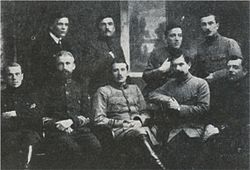- Andriy Melnyk
-
Andrii Melnyk or Andrij Melnyk
Андрій МéльникMelnyk Andriy-1-.jpg
Andrii Melnyk or Andrij MelnykBorn December 12, 1890
Drohobycz powiat, Galiсia, Austria-HungaryDied November 1, 1964 (aged 73)
Clervaux, LuxembourgAllegiance Ukrainian National Republic Service/branch Army Years of service 1914-1915, 1917-1919 Rank General, Commandant, Chief of Staff Unit Sich Riflemen Commands held Sich Riflemen Battles/wars World War I
Ukrainian Civil War
Ukrainian–Soviet WarOther work Politician, co-creator of the UVO and OUN Andriy Melnyk (Ukrainian: Андрій Мéльник) (December 12, 1890-November 1, 1964), Ukrainian military and political leader.
Contents
Life
Born near Drohobych, Galicia into a peasant family. Between 1912 and 1914 he studied at the Higher School of Agriculture in Vienna. With the outbreak of the First World War, Melnyk served as an officer in the Austro-Hungarian army as a volunteer with the Ukrainian Sich Riflemen where he commanded a company. Due to his kind demeanor, he was referred to affectionately as "Lord Melnyk" by fellow Ukrainian and Austrian officers, who felt that he embodied the English concept of a gentleman which at that time had been an ideal in Central Europe.[1] Melnyk was taken prisoner by the Russians in 1916. In captivity, Melnyk became a close associate of Yevhen Konovalets and joined the Ukrainian independence movement.
During the Soviet-Ukrainian War Melnyk supported Symon Petliura and was promoted to the rank of colonel in the Ukrainian People's Republic army.
 Members of the last supreme command of the Sich Riflemen. Melnyk is sitting, second from the left.
Members of the last supreme command of the Sich Riflemen. Melnyk is sitting, second from the left.
Together with Konovalets, Melnyk and several others founded the Organization of Ukrainian Nationalists (OUN) in 1929. Between 1924 and 1928 Melnyk was imprisoned for terrorist activities by the Polish government. During the 1930s, however, his career was much quieter than that of his colleagues. He basically retired from politics,[2] refrained from terrorist activities and worked as an engineer and as the director of forests on the huge estates of the Metropolitan of the Ukrainian Greek Catholic Church, Andrey Sheptytsky. More friendly to the Church than any of his associates (the Organization of Ukrainian Nationalists was generally anit-clerical), Melnyk even became the chairman of Orlo, the Galician Catholic youth organization that was regarded as anti-Nationalist by many OUN members.[1]
After the assassination of OUN leader Konovalets in 1938, the principal OUN leadership abroad could not choose a leader from amongst themselves, and therefore asked Melnyk to become leader of OUN in 1939.[2] He was chosen by the leadership in part because of the hope for more moderate and pragmatic leadership and by the desire to repair strained ties with the Catholic Church.[1] The group that had chosen Melnyk as their leader admired aspects of Benito Mussolini's fascism but condemned Nazism.[3] In 1940 a more radical faction of the OUN led by Stepan Bandera and based in Ukraine broke away from the OUN led by Melnyk in exile. The two rival organizations became known as Melnykites and Banderites. Since 1938 Melnyk was allegedly recruited by the German Abwehr[4] and after the German invasion of the Soviet Union he declared his own independent Ukrainian government in Rivne, competing with Bandera supporters for influence in western Ukraine.
Initially, Melnyk's more conservative and moderate supporters enjoyed support against Bandera's radicals from both the Ukrainian Greek Catholic Church and German military authorities. However, his position was contradictory. A conservative Catholic who maintained the officer's personal code of honor, Melnyk was at odds with aspects of the ideology of his own organization. His reluctance to assert dominance and engage in a ruthless pursuit of power placed him at a disadvantage over his younger and more violent rivals in the Bandera camp.[1] Many of Melnyk's close associates were killed by Bandera's Ukrainian Insurgent Army between 1941 and 1944 and Bandera's movement came to completely dominate the Ukrainian nationalist political milieu in most of western Ukraine. In 1944 Melnyk was briefly imprisoned by the Gestapo during a crackdown against the Ukrainian independence movement.
After the war, Melnyk escaped to the West and lived in Luxembourg, West Germany and Canada. He remained politically active and headed a number of Ukrainian émigré organizations. He died in Clervaux, Luxembourg, at the age of 74.
In late 2006, the Lviv city administration announced the future transfer of the tombs of Andriy Melnyk, Yevhen Konovalets, Stepan Bandera and other key leaders of the OUN and UPA to a new area of Lychakivskiy Cemetery specifically dedicated to the Ukrainian national liberation struggle.[5]
See also
Notes
- ^ a b c d John Armstrong (1963). Ukrainian Nationalism. New York: Columbia University Press, pp. 36-39
- ^ a b The History We Don’T Know. Or Don’T Care To Know?. Kost Bondarenko | Topic Of The Week | Politics
- ^ Encyclopedia of Ukraine Organization of Ukrainian Nationalists
- ^ Мельник Андрей
- ^ Information website of the Kharkiv Human Rights Protection Group
References
- Andrii Melnyk biography in Encyclopaedia of Ukraine
- "The History we don't know. Or don't care to know?", Zerkalo nedeli (Mirror Weekly), March 29, 2002, available online in English, in Ukrainian and in Russian.
Categories:- 1890 births
- 1964 deaths
- People from Drohobych Raion
- Ukrainian military personnel
- Ukrainian people of World War I
- Ukrainian people of World War II
- Ukrainian politicians before 1991
- Ukrainian refugees
- Ukrainian Austro-Hungarians
- Organization of Ukrainian Nationalists politicians
- Sachsenhausen concentration camp survivors
Wikimedia Foundation. 2010.

